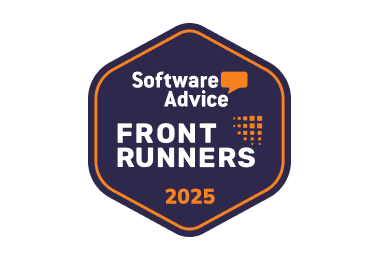Looking for a HelpScout Alternative?
Make the most of your customer support platform by switching to LiveAgent.
- ✓ No setup fee
- ✓ Customer service 24/7
- ✓ No credit card required
- ✓ Cancel any time
Used by

Tired of dealing with your help desk software?
Importing your data from Help Scout to LiveAgent is a piece of cake. Either follow our step-by-step guide and do it yourself, or contact us, and our technical support staff will be happy to migrate your data for you.
Migrate from HelpScout to LiveAgent in minutes. We offer an assisted HelpScout migration that will import all your data from Zendesk to LiveAgent. It’s free and takes only 5 minutes.
3 Reasons why Companies Choose LiveAgent over HelpScout
Find out how you gain by choosing LiveAgent among other alternatives:
Significant savings and ROI
LiveAgent offers a forever free plan, as well as three other plans for bargain price.
Increased Agent Productivity
Decrease the work time of your agents and solve more customer queries.
AI powered features
Our software offers over 179 help desk features, complemented by over 40 integrations.
HelpScout vs LiveAgent at a glance
| Feature | LiveAgent | Help Scout |
|---|---|---|
| Ticketing | ✅Yes | ✅Yes |
| Live Chat | ✅Yes | ✅Yes |
| Call Center | ✅Yes | ❌No |
| Self-Service | ✅Yes | ✅Yes |
| ✅Yes | ✅Yes | |
| ✅Yes | ❌No | |
| ✅Yes | ❌No | |
| Viber | ✅Yes | ❌No |
| ✅Yes | ✅Yes | |
| Knowledge Base | ✅Yes | ✅Yes |
| Customer Forum | ✅Yes | ❌No |
| Automation and Rules | ✅Yes | ✅Yes |
| API | ✅Yes | ✅Yes |
| Interactive Voice Response (IVR) | ✅Yes | ❌No |
| Video Calls | ✅Yes | ❌No |
| Unlimited History | ✅Yes | ✅Yes |
| Unlimited Websites | ✅Yes | ✅Yes |
| Unlimited Chat Buttons | ✅Yes | ✅Yes |
| Unlimited Tickets/Mails | ✅Yes | ❌No |
| Unlimited Call Recording | ✅Yes | ❌No |
| Unlimited 24/7 Support | ✅Yes | ❌No |
Unrivaled HelpScout Alternative
Boost your customer support and attract new customers. Use the potential of 175+ available help desk features, including a powerful ticketing system with automation, live chat, social networks, call centre and customer portal.
Why pay for 3 different products, when you can have everything in 1 for $39/month?
Multichannel integrations
LiveAgent offers more than 180 seamless integrations, so you can connect all the apps you need into one platform.
Connecting all the apps your customer service team uses every day can improve customer communication, response time, and overall customer experience. No additional costs charged.
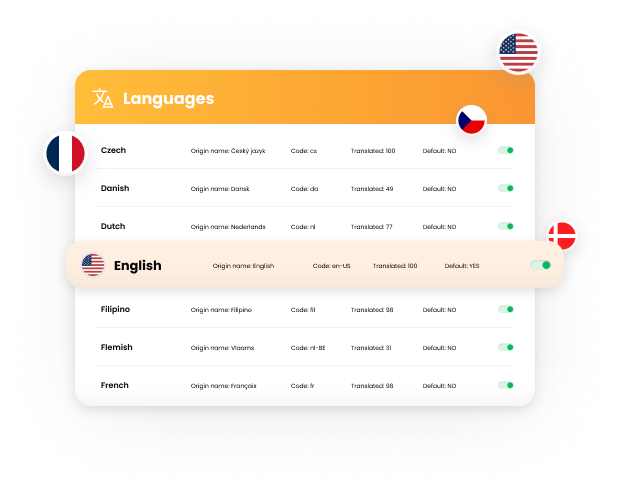
We're Multilingual
Our customer service software is multilingual. LiveAgent is available in 43 different language translations (some partial) and supports language adaptable widgets. Don’t let foreign languages create a barrier between you and your customers. We’ve got you covered.
Automated routine
LiveAgent reduces customer support costs, improves efficiency of your agents and saves their time via multiple automation rules. Eliminate any mistakes that could cost you your customers, revenue, or reputation by cutting out human intervention.
LiveAgent’s automation rules transforms your customer support by automating tasks like ticket transfers, tagging, and resolving issues. These rules, including action, time, and SLA rules, boost efficiency, reduce errors, and enhance customer satisfaction.
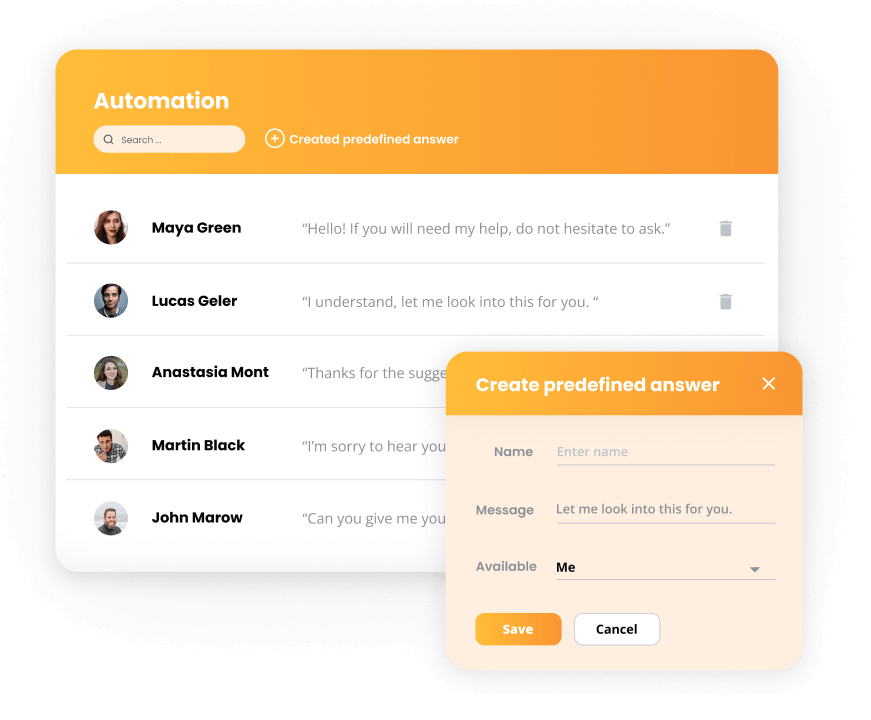
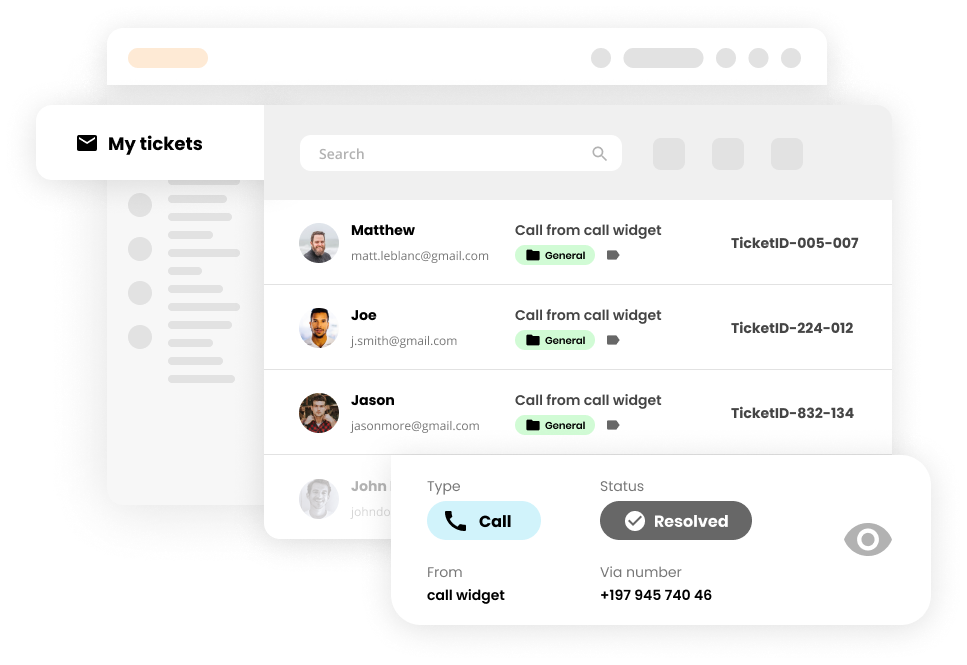
LiveAgent's powerful Universal inbox
Universal inbox ensures all your customer inquiries are on a single platform. Thus, all your live chats, emails, calls, social media, knowledge base, customer feedback are turned into so-called help desk tickets in a shared inbox. LiveAgent offers robust features for managing tickets, such as canned responses and private notes.
Your customer success team can use canned responses to answer repetitive questions/customer issues and internal notes to communicate within tickets (customer inquiries) privately. As a result, customer interactions are fast and effective.
Say goodbye to slow, subpar software
LiveAgent is the most reviewed and #1 rated help desk software, so we think it’s a perfect alternative to HelpScout.
Get 3 products for the price of 1 – help desk, live chat and phone support are all included.
LiveAgent will help you provide excellent customer support on all support channels. With powerful workflow automation and rules, your customer support team will save time and be more productive when solving customers’ queries.
Try LiveAgent for free and decide if it suits you better than HelpScout’s help desk solution.
LiveAgent vs HelpScout Comparison
Head over to Capterra to compare LiveAgent and HelpScout’s customer service platform ratings based on customer reviews
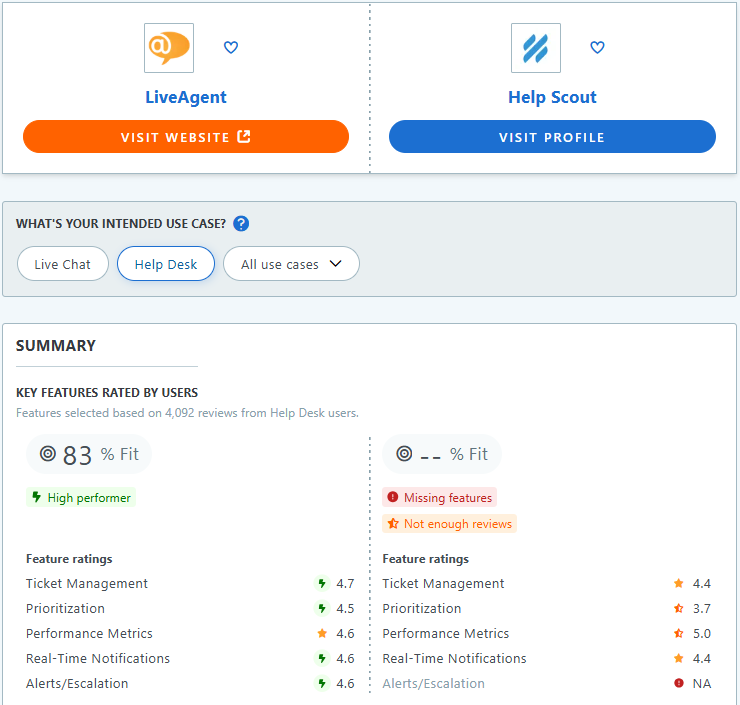
Still on the fence about the best HelpScout help desk alternative?
Here’s how upgrading to LiveAgent helped our customers boost their business performance:
-
![Roman Bosch]() It’s a pleasure to have a great portal that improves our customer service.Roman Bosch , Partly
It’s a pleasure to have a great portal that improves our customer service.Roman Bosch , Partly![Partly]()
-
![Christine Preusler]() LiveAgent empowers our agents to provide better, faster, and more accurate support.Christine Preusler , HostingAdvice
LiveAgent empowers our agents to provide better, faster, and more accurate support.Christine Preusler , HostingAdvice![HostingAdvice]()
-
![Karl Dieterich]() LiveAgent helped us to achieve 2 important goals: increase customer satisfaction and sales.Karl Dieterich , Covomo
LiveAgent helped us to achieve 2 important goals: increase customer satisfaction and sales.Karl Dieterich , Covomo![Covomo]()
-
![Hendrik Henze]() We have been using LiveAgent since August and we are really satisfied with it.Hendrik Henze , HEWO Internetmarketing
We have been using LiveAgent since August and we are really satisfied with it.Hendrik Henze , HEWO Internetmarketing![HEWO Internetmarketing]()
-
![Razvan Sava]() Since we are using LiveAgent our response time improved by 60%.Razvan Sava , Webmaster Deals
Since we are using LiveAgent our response time improved by 60%.Razvan Sava , Webmaster Deals![Webmaster Deals]()
-
![Taras Baca]() Our paid customer conversion rate went up 325% the first month we've set up and actively started using LiveAgent.Taras Baca , XperienceHR
Our paid customer conversion rate went up 325% the first month we've set up and actively started using LiveAgent.Taras Baca , XperienceHR![XperienceHR]()
-
![Andrej Ftomin]() I have to say, I have never experienced such a professional customer approach.Andrej Ftomin , TAZAR Group
I have to say, I have never experienced such a professional customer approach.Andrej Ftomin , TAZAR Group![TAZAR Group]()
-
![Matt Janaway]() We find LiveAgent to be the best live chat solution by far.Matt Janaway , The Workplace Depot
We find LiveAgent to be the best live chat solution by far.Matt Janaway , The Workplace Depot![The Workplace Depot]()
-
![Viviane Carter]() We use LiveAgent on all of our ecommerce websites. The tool is easy to use and improves our productivity.Viviane Carter , CSI Products
We use LiveAgent on all of our ecommerce websites. The tool is easy to use and improves our productivity.Viviane Carter , CSI Products![CSI Products]()
-
![Christian Lange]() With LiveAgent we’re able to give our customers support wherever they are.Christian Lange , Lucky-Bike
With LiveAgent we’re able to give our customers support wherever they are.Christian Lange , Lucky-Bike![Lucky-Bike]()
-
![Jens Malmqvist]() I can recommend LiveAgent to anyone interested in making their customer service better and more effective.Jens Malmqvist , Projure
I can recommend LiveAgent to anyone interested in making their customer service better and more effective.Jens Malmqvist , Projure![Projure]()
-
![Catana Alexandru]() I'm sure we would spend 90% of our day sorting through emails if we didn't have LiveAgent.Catana Alexandru , Websignal
I'm sure we would spend 90% of our day sorting through emails if we didn't have LiveAgent.Catana Alexandru , Websignal![Websignal]()
-
![Jan Wienk]() With LiveAgent we are able to keep our players happy by offering more efficient support resulting in higher return rates.Jan Wienk , All British Casino
With LiveAgent we are able to keep our players happy by offering more efficient support resulting in higher return rates.Jan Wienk , All British Casino -
![Allan Bjerkan]() LiveAgent is reliable, reasonably priced, and simply a great choice for any fast-paced online business!Allan Bjerkan , Norske Automaten
LiveAgent is reliable, reasonably priced, and simply a great choice for any fast-paced online business!Allan Bjerkan , Norske Automaten![Norske Automaten]()
-
![Sissy Böttcher]() We like it because it is easy to use and offers great functionality, such as useful reporting features.Sissy Böttcher , Study Portals
We like it because it is easy to use and offers great functionality, such as useful reporting features.Sissy Böttcher , Study Portals![Study Portals]()
-
![Peter Koning]() We love LiveAgent - it makes supporting our customers easy.Peter Koning , TypoAssassin
We love LiveAgent - it makes supporting our customers easy.Peter Koning , TypoAssassin![TypoAssassin]()
-
![Aranzazu F]() We like to offer our customers the best support experience. That’s why we chose LiveAgent.Aranzazu F , Factorchic
We like to offer our customers the best support experience. That’s why we chose LiveAgent.Aranzazu F , Factorchic![Factorchic]()
-
![Rick Nuske]() From setup to ongoing support and everything else in between, the team at LiveAgent continues to impress.Rick Nuske , MyFutureBusiness
From setup to ongoing support and everything else in between, the team at LiveAgent continues to impress.Rick Nuske , MyFutureBusiness![MyFutureBusiness]()
-
![Vojtech Kelecsenyi]() LiveAgent saves us hundreds of precious minutes every day by making customer service clear and in order.Vojtech Kelecsenyi , 123-Nakup
LiveAgent saves us hundreds of precious minutes every day by making customer service clear and in order.Vojtech Kelecsenyi , 123-Nakup![123-Nakup]()
-
![Rafael Kobalyan]() Unlimited agents, email, social media, and phone integration. All that for less than we were paying with our previous provider.Rafael Kobalyan , Betconstruct
Unlimited agents, email, social media, and phone integration. All that for less than we were paying with our previous provider.Rafael Kobalyan , Betconstruct![Betconstruct]()
-
![Martin Drugaj]() We’ve been using LiveAgent since 2013. We can't imagine working without it.Martin Drugaj , Atomer
We’ve been using LiveAgent since 2013. We can't imagine working without it.Martin Drugaj , Atomer![Atomer]()
-
![Ivan Golubović]() It's a cost-effective solution that can help you with a large amount of support requests via different channels.Ivan Golubović , AVMarket
It's a cost-effective solution that can help you with a large amount of support requests via different channels.Ivan Golubović , AVMarket![AVMarket]()
-
![Rustem Gimaev]() Answering emails from Outlook was so hard to manage. With LiveAgent we're sure every email is answered in time.Rustem Gimaev , Antalya Consulting Language Center
Answering emails from Outlook was so hard to manage. With LiveAgent we're sure every email is answered in time.Rustem Gimaev , Antalya Consulting Language Center![Antalya Consulting Language Center]()
-
![Randy Bryan]() LiveAgent is so awesome. With very little time and effort I had it up and running smoothly in a few...Randy Bryan , tekRESCUE
LiveAgent is so awesome. With very little time and effort I had it up and running smoothly in a few...Randy Bryan , tekRESCUE![tekRESCUE]()
-
![Timothy G. Keys]() I highly recommend the LiveAgent product, not only as a Kayako alternative but a much better solution with added value.Timothy G. Keys , Marietta Corporation
I highly recommend the LiveAgent product, not only as a Kayako alternative but a much better solution with added value.Timothy G. Keys , Marietta Corporation![Marietta Corporation]()
-
![Mihaela Teodorescu]() The support team always responded promptly with quick to implement solutions.Mihaela Teodorescu , eFortuna
The support team always responded promptly with quick to implement solutions.Mihaela Teodorescu , eFortuna![eFortuna]()
-
![Hilda Andrejkovičová]() It helps us categorize the nature of the tickets and statistically track what our clients need most.Hilda Andrejkovičová , TrustPay
It helps us categorize the nature of the tickets and statistically track what our clients need most.Hilda Andrejkovičová , TrustPay![TrustPay]()
-
![Alexandra Danišová]() We see LiveAgent as a great tool for communicating with customers.Alexandra Danišová , Nay
We see LiveAgent as a great tool for communicating with customers.Alexandra Danišová , Nay![Nay]()
-
![Samuel Smahel]() LiveAgent sped up our communication with our customers and gave us an option to chat with them as well.Samuel Smahel , m:zone
LiveAgent sped up our communication with our customers and gave us an option to chat with them as well.Samuel Smahel , m:zone -
![David Chandler]() Simply put - LiveAgent beats everything out there at this, or even higher, price-points.David Chandler , Volterman
Simply put - LiveAgent beats everything out there at this, or even higher, price-points.David Chandler , Volterman![Volterman]()
See why our Customers Chose LiveAgent as their Preferred HelpScout Alternative
Feel free to check out what other customers are saying about LiveAgent. LiveAgent has collected more than 2800 reviews on various software marketplaces like Capterra, Trustpilot, GetApp, G2, Software Advice.
Compare us with others
Provide excellent customer service.
Discover unparalleled customer support with LiveAgent's all-in-one software. Benefit from 24/7 service, a free trial without a credit card, and seamless integration across 130+ ticketing features. Enhance your business with fast setup, AI assistance, live chat, and more. Choose LiveAgent for exceptional service and satisfied customers.
Discover how LiveAgent's extensive integrations, plugins, and apps can enhance your help desk software and boost customer satisfaction. Explore popular integrations with VoIP partners like Hero, Orion, and Redspot, plus CRM, eCommerce, and more. Visit us to streamline your communication and elevate your business with easy integration guides.
You will be
in Good Hands!
Join our community of happy clients and provide excellent customer support with LiveAgent.

Our website uses cookies. By continuing we assume your permission to deploy cookies as detailed in our privacy and cookies policy.
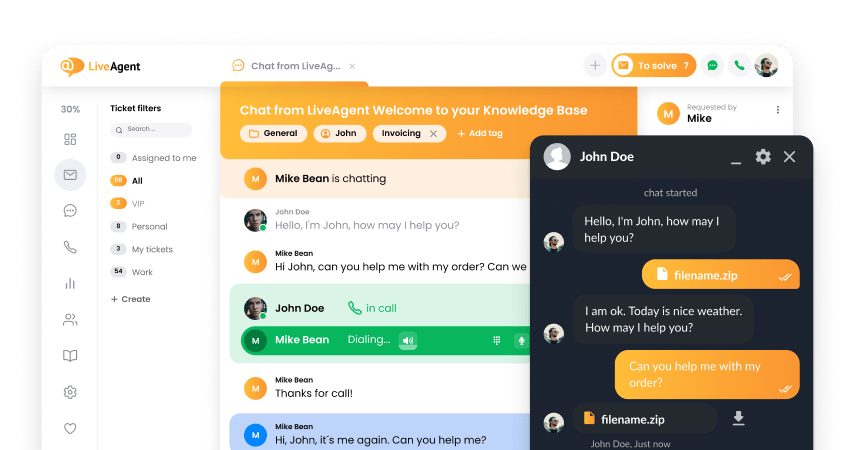
- How to achieve your business goals with LiveAgent
- Tour of the LiveAgent so you can get an idea of how it works
- Answers to any questions you may have about LiveAgent

 Български
Български  Čeština
Čeština  Dansk
Dansk  Deutsch
Deutsch  Eesti
Eesti  Español
Español  Français
Français  Ελληνικα
Ελληνικα  Hrvatski
Hrvatski  Italiano
Italiano  Latviešu
Latviešu  Lietuviškai
Lietuviškai  Magyar
Magyar  Nederlands
Nederlands  Norsk bokmål
Norsk bokmål  Polski
Polski  Română
Română  Русский
Русский  Slovenčina
Slovenčina  Slovenščina
Slovenščina  简体中文
简体中文  Tagalog
Tagalog  Tiếng Việt
Tiếng Việt  العربية
العربية  Português
Português 
